Keyword Research- The Ultimate Guide 2024

-
by Hemant Sharma
- . Updated April 25, 2024
In this Keyword research guide, I will show you a stepwise process to do keyword research in 2023.
So if you want to learn:
- What is Keyword Research?
- Why is Keyword Research Important in SEO?
- How to find the right keywords with free and premium tools
- Advanced SEO keyword research tips and strategies
And much more…
You’ll love this in-depth guide.
Let’s get started.
Table of Contents
Chapter 1
Keyword Research Basics
Let’s start with the fundamentals first.
In this lesson, you’ll understand what is keyword research and why it’s important?
What is Keyword Research?
Keyword research is the formula of finding the relevant words or phrases your target audience type in search engines like Google, Bing, YouTube and Yahoo to find specific information.
Why is Keyword Research Important for SEO?

When it comes to writing content for your site – there are two ways:
First, you just pick up any topic relevant to your website and start writing. But your blog may end up getting very little or almost zero traffic because you don’t know if people are looking for the information related to your content. But, unfortunately, that’s what most of us do.
And the other way of writing content is – using the right SEO methods & tools; you find out what topics people care about and how popular those topics are among your audience. Next, you can use these topics to dictate which keywords you are looking for and target.
In other words: keyword research gives you insight into what your targeted customers look up for the exact words and phrases they use.
So if you want better Google rankings, higher traffic and conversion, keyword research should be an integral part of market research.
How is Keyword Research Contributing To My Site's Traffic Growth?
A few months back, I used the process of keyword research to uncover a low-competition keyword: zero-click search.
And I created SEO-optimized content around that term: Zero Click Searches 2023.
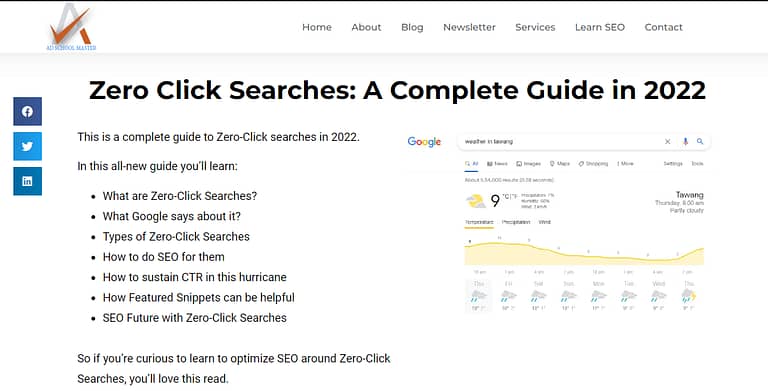
Because the keyword wasn’t highly competitive, my site ranked #2:
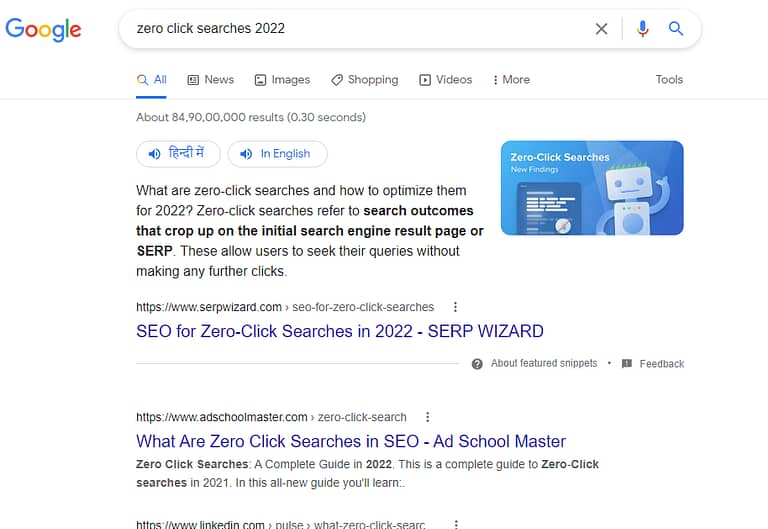
And that single page brings hundreds of visitors from Google every week:

Chapter 2
How to Discover Keyword Ideas
Now, you have understood the basics of keyword research. So lets start your keyword research training.
I’ll help you find out best possible ways to find keyword ideas for the content.
I’ll also show you how you can use free as well as some premium keyword research tools to get the job done.
Without any further ado, let’s get started.
Build a List of Topics
You need to think of topics that your targeted customers are interested in.
For example, let’s say you run a digital marketing agency.
Now, ask yourself:” What topics people in your audience search for that are related to my business?
Some topics that come to your mind would be like:
- What is SEO in digital marketing
- SEO consulting
- Social media marketing
- Email marketing
- SEO vs SEM
- Content marketing
- Lead generation
- SEO keyword research tips
These topics aren’t keywords yet.
Let’s dive into different ways to find out keywords right now.
Google Suggestion
Google offer many suggested keywords right in the search to help people find the most relevant results.
Let’s use these three features to find keyword ideas:
Autocomplete
Now that you have the list of topics type each one of them into Google.

These are fantastic keywords to add to your list.
Why?
These are based on actual searches by people, and they can be an excellent inspiration for interesting keywords.
Pro tip: Give some space before the search term, and you will see Google is suggesting a different set of searches.
People also ask
One of the fantastic features you can find in Google search results is called the “people also ask” snippet. It appears mostly for questions and suggests other related questions.

Pro tip: Click on one of the queries; it will show more related keywords. This way, you can load the “numerous” questions.
What are you waiting for? Then, add them to your list of keyword ideas.
Searches related to
Another terrific way to find keywords is to check out the “Searches Relate to” section at the bottom of Google’s SERP.
For example:
Let’s say one of your topics was “ExamLabs“.
Search for that in Google.
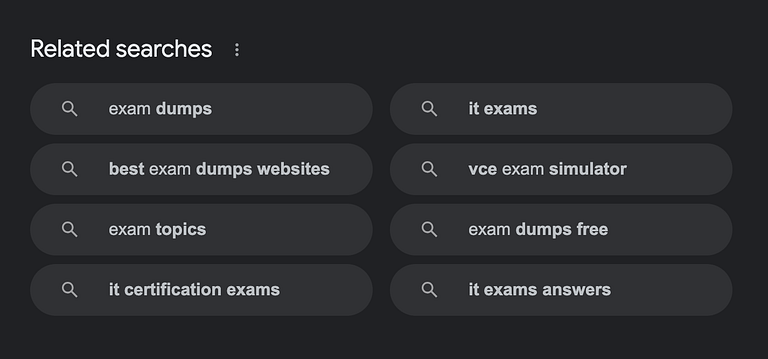
Scroll to the bottom of the SERP. You’ll find a list of eight keywords that are closely related to your searched keyword.
Just like Google suggest and People also ask, these keywords ideas that originate directly from Google.
There is, therefore, no need to guess whether they are popular or not. Google is telling you: “lots of people search for these keyphrases.”
Pro tip: Click on any of the “Searches Related To” keywords. Then, scroll to the bottom of the page. Google will give you a new list of related keywords. Repeat the process.
For example, I clicked on “types of content marketing” and Google is suggestion a whole new set of suggestions from the “searches related to” feature.

YouTube Autocomplete
You can also find keywords with YouTube suggest:

Pro tip: Use “Kparser” an amazing Free YouTube keyword suggestion tool to speed up the process.
And Bing

and Yahoo!

Wikipedia
Wikipedia is the world’s most extensive online information repository. Hence, it is a goldmine for keyword research.
Here’s how to use Wikipedia to come up with keyword ideas.
Head over Wikipedia and search for your topic or keyword.

You’ll be taken to the Wikipedia entry for that broad topic.
Write down keywords from the first paragraph.

Then, check for the “contents” section of the page. This will provide you with much more niche-related (subtopics) keywords.

And some of the subtopics provided here are excellent keywords that would be difficult to come by in any other manner:

Additionally, You can also click on some internal links to check out the Table of Contents of other closely related entries.
For example,
When you click on “Plant milk and dairy product alternative”, it will take you to a page where you may add even more keywords to your list:

Nice! Right?
Quora
Quora is a forum to find out what questions are “hot” or “trending” to inspire keyword ideas.
To find out the keywords to add to your list – simply head over to Quora and search for your topics and keep an eye out for the questions related to your niche people are asking.

One of the most significant internet communities is Reddit that covers almost any topic under the sun.
Hence, it can be a great place to find people interested in your niche and discover the topics they discuss.
Here’s how:
For example, you run a site that sells hand sanitisers.
You’d head over to Reddit. Then search for your broad topic that your target audience is interested in.

Then you can select a specific subreddit and look at the most popular posts. You can also search for question type posts in the subreddit.

In this case, you can add “keyword” to your list of keywords.
Pro tip: “Keyworddit” is the only free SEO tool that you can use to extract the frequent keywords from a subreddit of your choice.

Amazon Autocomplete
Are you an affiliate marketer? An e-commerce store owner?
Don’t forget about Amazon.
Amazon (like Google) also collects data for popular searches and offers automatic suggestions.
You’d go to Amazon and search for keywords related to your niche.
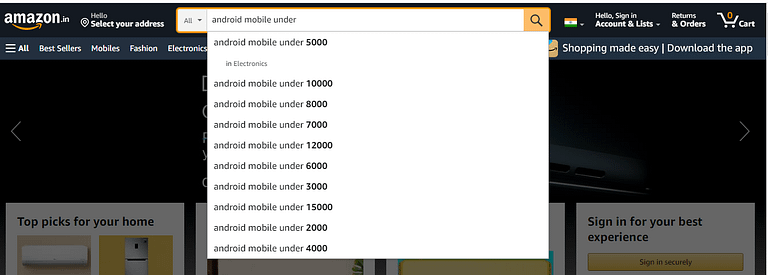
Pro tip: You can also use a free tool like Keywordtool.io to get Amazon keywords.
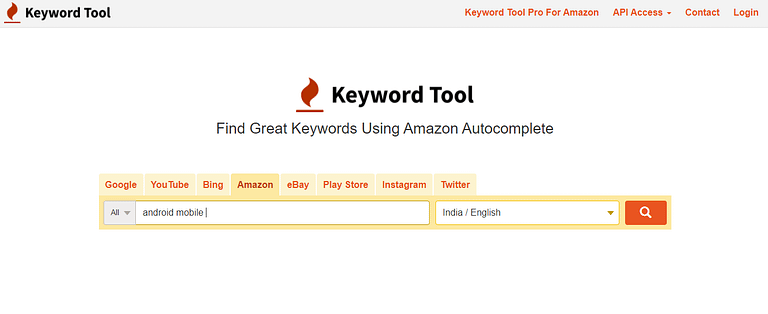
Forums
Forums are like online discussion boards where people can ask questions, share their experiences, and discuss topics of mutual interest.
So how can you find forums with groups of people interested in your business?
The simplest way to find forums where your targeted audience hangs out is to use these search strings in Google:
“Keyword forum”
“Keyword” + “forum”
“Keyword” + “forums”
“Keyword” + “board”
You will find – most forums are divided into sections. Each of these sections contains potential keywords for your list of keyword ideas.
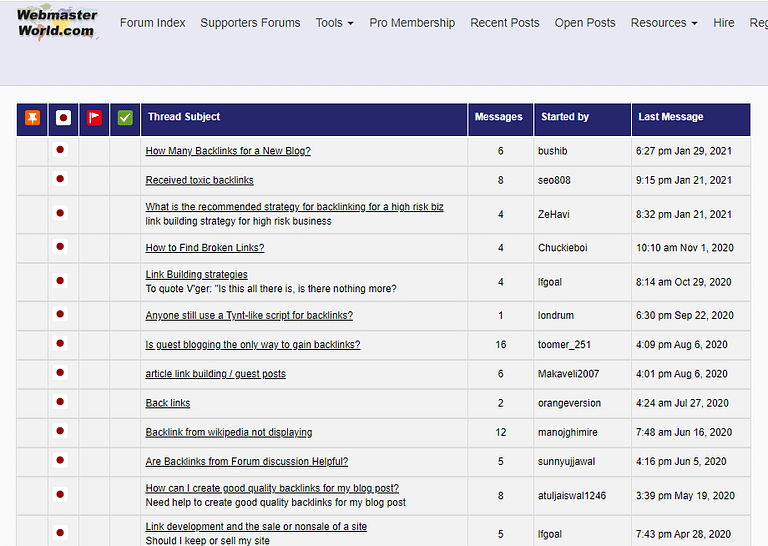
Make sure to explore threads on the forums to find other specific topics that your target audience discuss:

Pro tip: Look at the number of posts and recent posts to identify active forums.
Facebook Groups
Facebook Groups can help find the topics of discussion and engagement that earn the audience’s attention interested in your niche.
Simply, head over to your business related Facebook Groups and search for the topics your audience is interested in.

Chapter 3
How to Use Keyword Research Tool
Of course, you can find keywords without tools. But tools make your life much easier.
Here are the tools that I use to do keyword research.
Google Keyword Planner
Google Keyword Planner comes straight from Google. Hence, it can be the most reliable source of information for keyword information.
The downside of GKP is that it’s designed to help people with their Google ads paid campaign, not SEO.
However, it still can be used to discover keyword ideas.

And search queries that get massive searches.

Keyword Surfer
Keyword Surfer is a free Chrome extension, and it displays global and monthly search volumes for any Google query. And its developer has promised to keep this tool “100% free, forever.”
It shows you keyword ideas from inside Google’ search results.
Just install this free extension to your Chrome, and next time you search, it will show you a list of keyword ideas with some data.

Ubersuggest
Ubersuggest is a limitedly free online tool that helps you generate keyword ideas. Additionally, it shows you data on each keyword (like search volume, CPC, keyword difficulty and more).

SEMrush
If you want to spend money on a tool, I’d recommend one tool: SEMrush.
It can save a lot of time.
With SEMrush, you can quickly steal your competitor’s keywords for which they’re already ranking and enjoying traffic.
Here’s how to do it:
Head over to SEMrush and just pop into the site you are competing against.

And it will show you all of their keywords.
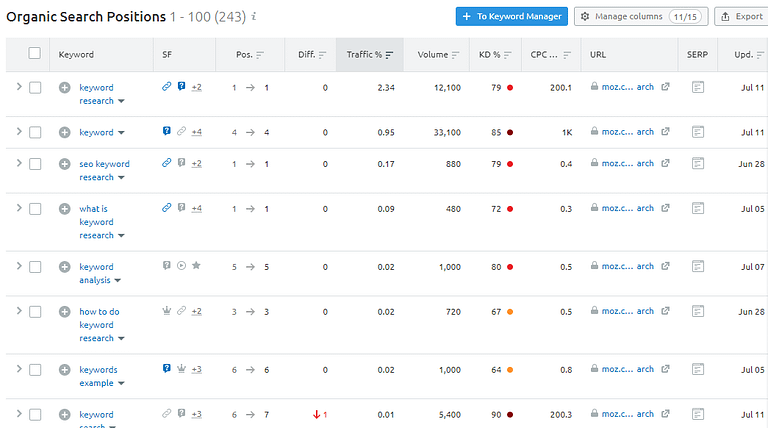
Ahrefs
Ahrefs is popularly known as a link-building tool.
But it is less known for its excellent keyword research capabilities.
When concentrating on a particular term, there aren’t many tools that can compete with Ahrefs keyword explorer.
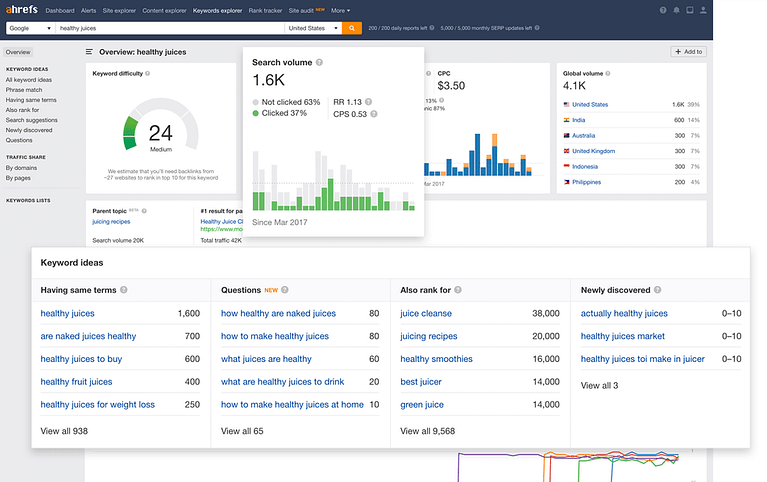
Chapter 4
Understand Keyword Difficulty
How do you know if the keyword is too hard to rank for?
It’s an important question.
Because if you choose keywords that are too competitive, you might get trouble ranking even in Google’s top 40s.
But if you can find less competitive keywords, you have a good chance of cracking the top 3.
Here’s how you can find out a keyword’s ranking difficulty.
Most SEO experts divide keywords into three main categories:
Head, body and the long tail keywords.
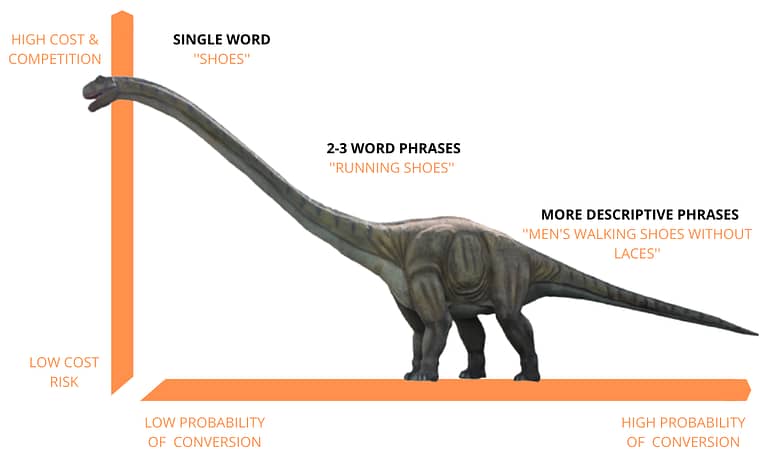
Head Terms
Head term keywords are usually single-word keywords with high search volume and competition.
These keywords are difficult to rank for. Also, the user’s intent is not very clear, so they don’t convert very well.
For example, if a user types “shoes”, you might not understand what the user is asking for; he might be looking for running shoes or just wants to see shoe images.
Body Keywords
Body keywords are usually 2-3 word phrases that get decent search volume but more specific than Head Keywords.
For example: “running shoes” or “Order shoes online” are Body Keywords. These are less competitive than Head Keywords.
Long Tail Keywords
Long tail keywords are long, 4+ words phrases that are usually very specific. These keywords have low to moderate search volume and easier to rank for.
The intent of the user is also obvious.
For example: “best running shoes for kids” or “men’s walking shoes without laces” are long tail keywords.
They don’t get a lot of search volume, but long tail keywords make up most searches online when you add them together.
And because they get significantly fewer searches, long tail keywords aren’t hugely competitive.
There is no “best” keyword category to concentrate on; each has its own set of advantages and disadvantages.
Long tails, on the other hand, are the greatest when it comes to competition.
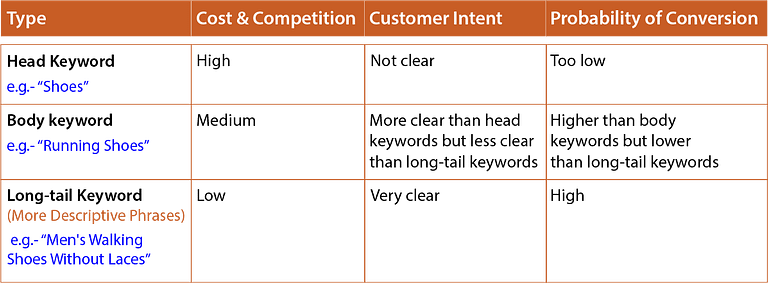
Google’s First Page Results
Another quick way to evaluate keyword’s competition level:
Go to Google and type in your term.
Then take a look at the sites that appear on the first page of the results.

If these are authoritative sites like Wikipedia, Salesforce, Microsoft etc. then you might want to drop that keyword from your list.

But if you see small blogs, that’s a sign that you have a shot to hit the first page too.
Keyword Difficulty in Tools
The majority of the keyword tools show keyword difficulty scores:
SEMrush
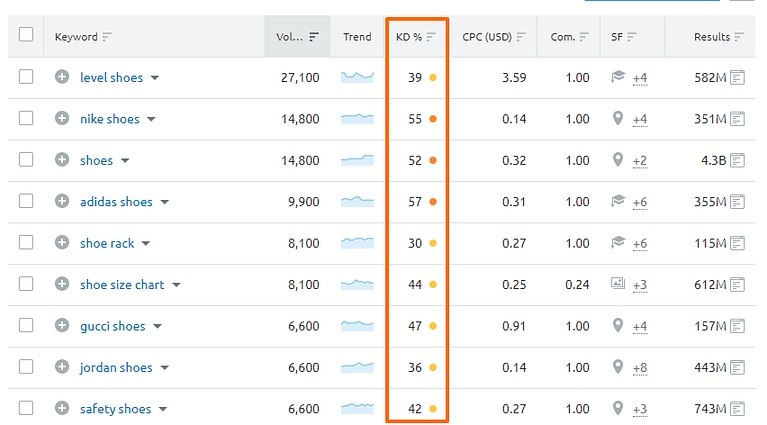
Moz Pro
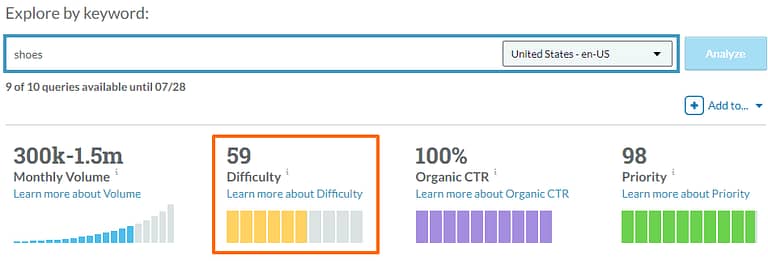
Ahrefs
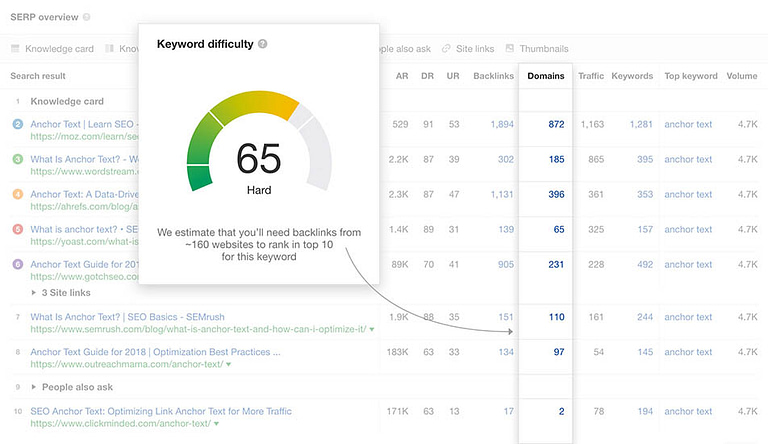
In a nutshell, majorly all the tools calculate keyword difficulty scores based on page authority and domain authority. However, the keyword difficulty score varies with the tool.
So it’s ok to just go with a keyword difficulty score what your tool shows because they tend to give a general idea of how competitive a keyword is to rank for.
Can I Rank
Can I Rank is a wholly dedicated tool to keyword difficulty.
The best part is that it doesn’t give you a difficulty score; instead, it assesses the level of competition for a keyword concerning your website.
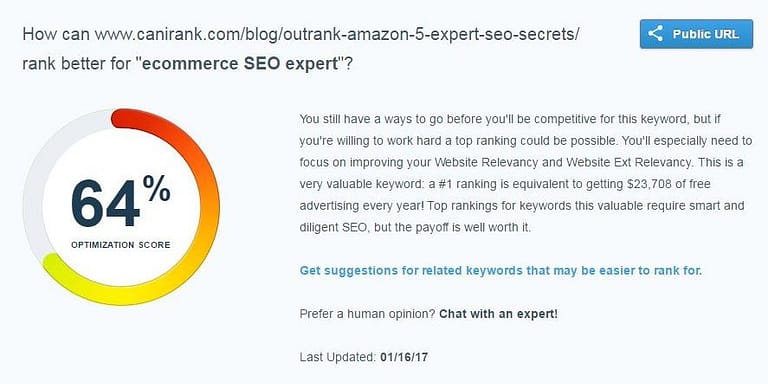
Amazingly helpful, right?
Chapter 5
How to Choose a Keyword
It must be a huge keyword list by now, right?
And you must be wondering, which keywords you should focus on.
Without any further delay, let’s just start the lesson – how to choose a keyword.
Volume
It refers to the number of times a particular keyword has been looked for in a given period.
Of course, the higher the volume is, the better it is.
The question is:
How much is search volume good?
Well, it depends on your industry.
For example:
A long tail keyword in the footwear niche (like: “best running shoes for men”) gets almost 22k searches per month:

But long-tail keywords in a B2B space like digital marketing (like: “best link building tools”) only gets 20 monthly searches.

That’s why you figure out “high” and “low” search volume numbers in your niche.
Then, choose keywords based on what’s “ideal” for your industry.
But…should you ignore keywords for those volume shows zero?
15% of Google searches are new everyday. And it’s obvious that all keyword tools will not have data for the queries that are searched for the first time.
Hence, it doesn’t make sense leaving a keyword just because the tools show no volume for it.
Organic CTR
Clicks on Google’s organic results are going down – thanks to more ads and increasing featured snippets results on the top of SERP.
Search volume of keywords alone doesn’t tell you the whole story of a keyword. How many people click on them is equally important.
The best thing I like about Ahref is – detailed SEO metrics.
You can use CPS (Click per search) metric to decide whether the keyword you’re choosing is going to bring you a good number of clicks or not.
For example, the keyword “Trump age” gets lots of searches on Google but not many clicks because Google shows the answer in the snippet on top of the SERP.

Look at the search volume of a keyword with CPS – you can see if the keyword will bring value to your site.
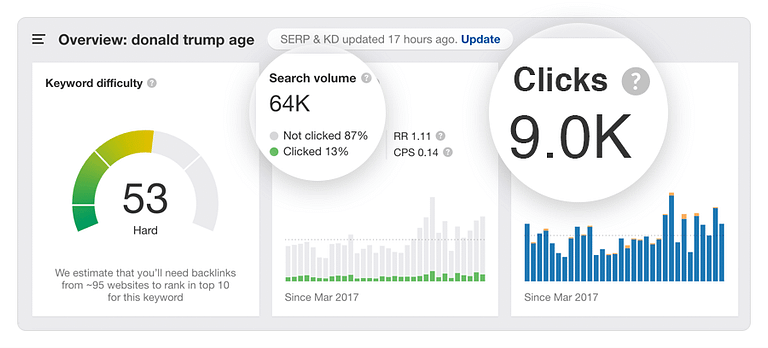
Alternatively, you can also look for organic CTR report in the tool like Moz Pro:
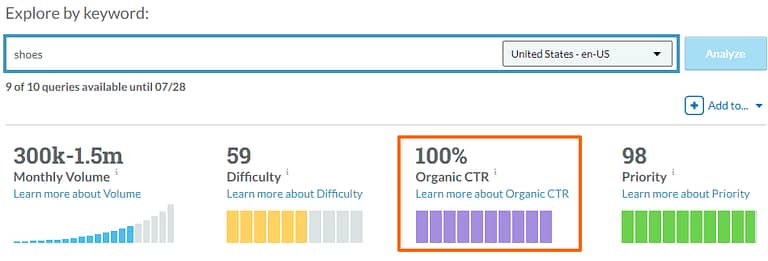
With all that said:
I wouldn’t eliminate a keyword because of its low CTR. If a good number of people searches for that term, it may still be worthwhile to pursue.
CPC
CPC is the only metric that tells you a vital thing:
Do people who search for this keyword spend money?
Search volume is significant, but if the keyword has zero commercial intent – then there’s no point in going after that.
Also, you can sometimes get a great ROI from a keyword that doesn’t get that many searches, but CPC is high enough.
Difficulty
If your site is brand new and doesn’t have tons of links yet, target low competition keywords. Usually long tails, as I have mentioned earlier – long tails are the easiest ones for a newbie.
Once your site grows into a more authoritative site – you can start going after competitive terms.
Business Fit
Business fit assessment helps you discover the keyword’s search intent to see whether the keyword is relevant to your business.
There are four primary search intent queries users usually perform:
- Navigational – search queries that seek a particular online destination, such as Facebook or the homepage of the IPL.
- Informational – user seeks information, such as the name of the brand or the best restaurant in Delhi.
- Transactional – action queries such as buy a plane ticket or listen to a song.
- Commercial – the user wants to research before purchase.
The most straightforward approach to figure out the keyword’s intent is to Google it and see what comes up first. SERP.
Let me explain you with an example:
Let’s say you run an SEO training company and you want a focus keyword that can help you sell your SEO training courses.
You find the keyword “Google rank checker”. It has a substantial search volume with a decent CPC, and it seems pretty easy to rank for.
What’s the best Google rank checker tool? Isn’t that a catchy title?
However, a glance at the SERPs will reveal that your chosen keyword is inappropriate for your content.

Why? The search intent doesn’t match.
Google clearly understands “backlink checker” as a navigational keyword – all the results are of tools that can help you check backlinks.
Even if you rank on this keyword, you won’t generate significant traffic for your site. Hence, this keyword is not a business fit.
Better drop this keyword to find a focus keyword having a practical intent.
Content Alignment
Keywords that you choose today will lay the foundation for your website content.
In other words, keywords will become topics on your website.
Hence, it’s extremely important to focus on your content alignment.
Let me explain through an example:
Suppose you’re a web developer.
Your targeted audience is business owners who want to have a business website.
To target them, you produce content like ‘how to create a business website’.
Now:
Your content is excellent. And it also starts to bring you some traction.
But the thing is, that doesn’t increase your revenue.
because there’s a content alignment problem.
Let me show you how-
Business owners care about things like ‘how to increase their sales.’
The bottom line is that they don’t care about ‘how to create a website’.
When they want a website, they’ll hire an expert like you.
But here’s the kicker:
People like business owners will be very much interested if
you produce content like ‘how a website can increase your sales’
To sum up,
Focus on ‘content alignment’ to choose an appropriate keyword for your site.
Trends
Finally, you’ll want to check if your keyword is gaining traction or fading away.
And the best way to do that?
Google Trends.
For example, last year, I got stuck between 2 keywords: Google Adwords vs Google Ads.
Google Adwords is the former name of the Google advertising platform, while it is presently called Google Ads.
Search volume for both the terms was quite similar, which made it harder to choose one.
I quickly popped both the keywords in Google Trends to find which one is more popular.
As you can see, interest in “Google Ads” is overgrowing.
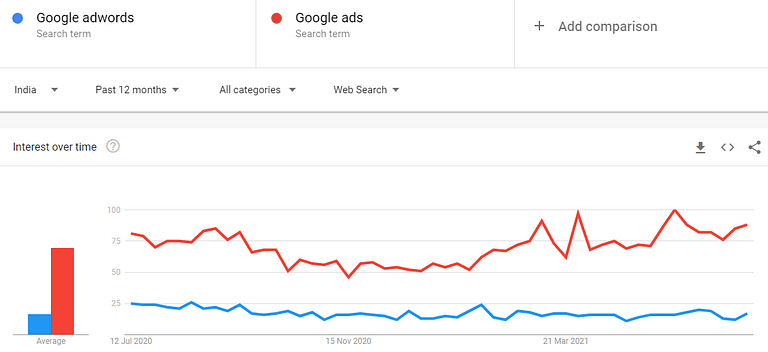
Amazingly helpful, right?
I also have a YouTube video on Keyword Research – in case you want to watch it before moving on to the next and final chapter – Advanced Keyword Research Tips and Strategies.

Chapter 6
Advanced Keyword Research Tips & Strategies
Are you driving traffic with your keywords?
But it may not be enough because no amount of traffic is enough.
It would be best if you continually keep it also improving to sustain the success.
That’s why Keyword Research is a never-ending process.
Let’s see how to use some tips and strategies to level up the game.
Google Search Console
Google Search Console helps you understand your website’s organic search performance.
This means it displays a lot of information about the keywords for which you now rank.
Here’s how to use Search Console to dig in for golden keywords specifically for your site:
First, head over to “Performance Report” in GSC.
This report displays the search terms that provide the most traffic to your website.
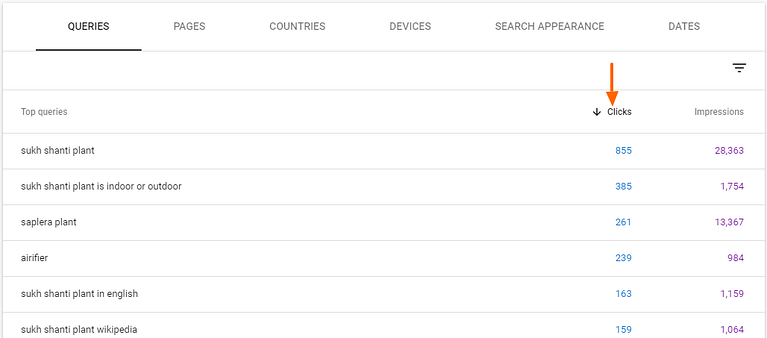
Now sort the list by “Impressions.”
This shows you a list of keywords that get lots of impressions but not enough clicks.

Finally, either create a new piece of content optimised around that exact keyword or optimise a piece of existing material centered on that keyword, and you’re all set.
These are keywords people are searching for, and Google sees your site as a fit in the search results for these terms.
Another important takeaway from the insights is that your page may be less than enticing in the search results if your CTR is low despite ranking high. You can often fix this by improving your title tag or meta description, or both.
SEMrush Keyword Gap
Keyword Gap is one of my favourite features in SEMrush.
With Keyword Gap – you can compare your site keywords with up to five competitors.
Here’s how it works:
First, head over to the “Keyword Gap” tab in SEMrush.
Enter your domain with up to five of your competitors. And click on “Compare”.
Here you go.
Under the “Missing” header – it will show you all the keywords your competitors rank for, but you do not.
Additionally, you can click on view details to see the list with much more details.
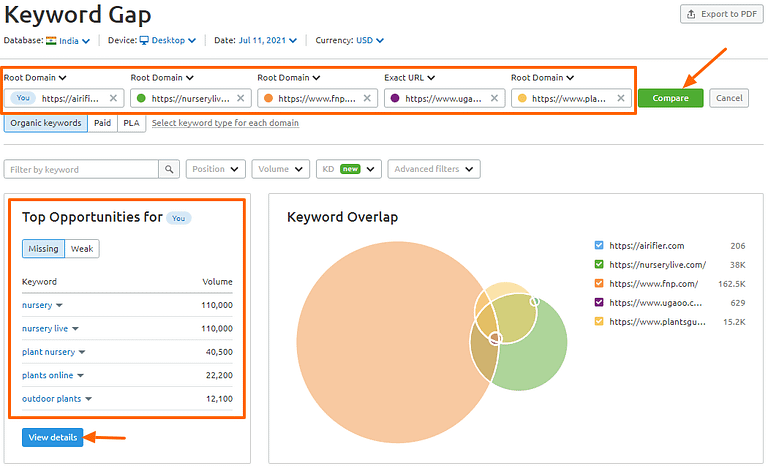
Since many competitors rank for these terms, you can also take advantage of these missed opportunities.
Barnacle SEO Approach
Barnacle SEO is a strategy where you leverage other dominant sites’ rankings to rank your content on the first page, especially when ranking for incredibly competitive keywords just isn’t a possibility.
For example:
Let’s say I start a brand new website for SEO training services.
I don’t need to say how valuable the keyword “SEO training” is for my website. So I went ahead and published content optimised around “SEO Training.”

At the same time – I understand it’s almost impossible for a brand new website to rank for such a highly competitive keyword.
When I search for “SEO training” on Google, I find many results from YouTube videos.

YouTube is an authority website and ranks for such highly competitive keywords on Google search.
So I can create SEO-optimised videos around the “SEO training” keyword and take advantage of YouTube dominance on Google.
Hence, through Barnacle SEO – You take help from other authority sites like LinkedIn, Medium, Wikipedia, YouTube etc., to grab a space for yourself on the first page.
Optimise Your Content with Synonyms and Related Keywords
You should focus on your primary keyword.
But you should also optimise your content around synonyms and closely related phrases.
Let me show how it works in real life with an example:
Two years back, I published a page focused on “SEO training”. I also included closely related terms like “white hat SEO.”

And I ended up ranking #1 on the keyword “white hat SEO training.” And I still rank as of today.

Keep Optimising for Keywords other than your Main Keyword
Main product keywords are usually highly competitive.
You shouldn’t miss targeting keywords that your customers are searching for – when they’re not looking to buy your exact products.
For example:
My main work area is SEO training.
But I am not writing content for commercial terms like “SEO Training” for every page on my site.
Recently I published content optimised around the keyword “SEO vs SEM“.

This blog is generating over a hundred of visits each week.

How about one more example:
I also published a blog around the keyword “Importance of digital marketing.”
Again this keyword is not directly related to my core services but broadly related to my industry.
However, it’s managing to bring a few hundred visitors each week:

I am sure it’s pretty clear that you should also focus on keywords other than your main product keywords because those are keywords that your customers are interested in and also less competitive.
And they provide you with higher chances to get your business in front of interested people. Believe me – whenever they will be ready to make a purchase, they’ll look for your brand.
So it’s essential to keep finding and publishing content around such keywords that may not be directly related to what you sell.
Takeway
Keyword research helps you decide the best possible direction you should drive your website towards.
Now it’s on you – what directions are you going to follow?
I hope you’ve enjoyed this keyword research guide 2023.
Are you going to try Barnacle SEO?
Or maybe you want to dig in Search Console to find more opportunities.
Let me know in the comments below.








21 Responses
What an awesome piece of content. Full of great tips.
This is really interesting, You are a very
skilled blogger. I’ve joined your rss feed and look forward to
seeking more of your magnificent post. Also, I’ve shared your site in my social networks!
Thanks!
I am truly thankful to the holder of this website who has shared this fantastic article on advanced keyword research at here. Hipolito Elvin
Thanks Elvin
A big thank you for posting a such an amazing seo keyword research guide. Much thanks again. Frankie Pantaleo
Thanks Frankie
This is a good keyword research guide for beginners and for experts too. It is really helpful.
Glad you liked it!
There can not be better free blog keyword research guide.
Happy to hear that:)
Thought there can’t be any better SEO keyword research guide than Backlinko keyword research. But I was wrong.
That’s amazing. But I too keep learning a lot from the best SEO guy – Brian Dean. He’s beyond compare. But thank you:)
Super helpful reading this keyword research guide 2022.
Thanks!
I really want to thank you a lot for your helpful blog posts about keyword research. You are very knowledgeable in this area, Thank you for giving me the knowledge and tools to make my blog better and get more visitors.
Glad to hear that mate, thanks!
Thank you for a Really grateful content brother, even though I have already read few articles, blogs regarding the keyword research . The content you gave is amazing. I will definitely implement these tricks in my endeavours. Love, Respect.
Your comment has made my day, brother! Thanks:)
This is a good take on keyword research. One can get a lot of insights by reading into their customer interactions such as blog comments, service request emails, reviews etc. It is very important to incorporate your customer’s language in your web pages and blogs to increase readability. Another point I would like to add is doing a competitors analysis. This way your keyword research is holistic & effective.
100% Agreed, mate!